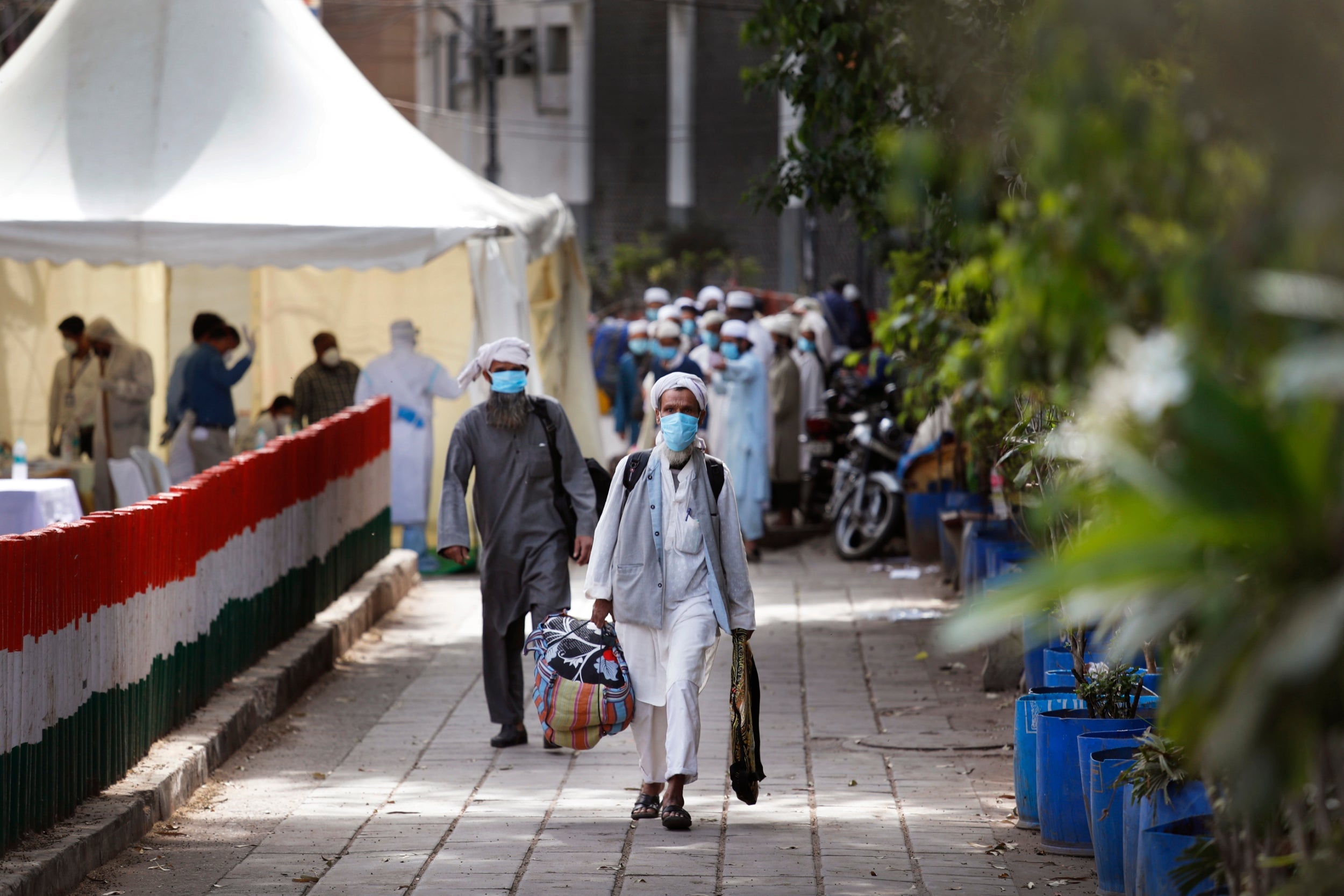Why an Islamic gathering in Delhi has taken centre stage in India’s coronavirus debate
Organisers say hundreds were stranded at Nizamuddin West event after a lockdown was suddenly declared — but some are now blaming event for spreading coronavirus across country

Police in Delhi have issued preliminary charges against a Muslim preacher for organising an event at a mosque in the capital that has been directly linked to a number of coronavirus cases across the country.
Around 1,750 people are believed to have attended the training course organised by Islamic missionary organisation Tablighi Jamaat, including more than 200 foreign nationals and visitors from many Indian states.
The event took place on Saturday 21 March, two days before Delhi was formally placed under lockdown measures but some 36 hours after Narendra Modi first addressed the nation comparing the fight against coronavirus to a world war, urging people to observe social distancing and “stay away from crowds and gatherings”.
Organisers have said they cooperated at all times with instructions from health officials, but hundreds were still staying at the Tablighi Jamaat Markaz (centre) in the Nizamuddin West enclave when the city’s lockdown was declared.
But on Tuesday an initial charge sheet, known in India as a first incident report (FIR), was lodged against Tablighi Jamaat preacher Maulana Saad and other organisers under the colonial-era Epidemic Diseases Act (1897) for encouraging a large gathering during an outbreak.
The entire neighbourhood has now been sealed off from outsiders as police evacuated more than 1,500 people to be taken into quarantine.
Delhi’s chief minister, Arvind Kejriwal, said that of those evacuated, 441 were showing symptoms of Covid-19 infection and were taken in buses straight to hospital.
“Of [Delhi’s 97] cases, 24 are related to the Markaz,” Mr Kejriwal told reporters. Officials in other states are racing to track attendants of the training course, with positive cases linked to the event confirmed in Telangana, Tamil Nadu and in Kashmir, where a man connected to the Markaz died on 26 March.
Mr Kejriwal said holding the event had been a “very irresponsible thing to do”. “This disease has gripped the entire world,” he said. “Gurdwaras (temples) are shut, people are not coming to masjid (mosque) to pray and are praying at home. Mecca is empty, Vatican City is empty. At such a time to have held such a big gathering was wrong.”
Communal tensions were already bubbling up across the country at the end of the first week of a 21-day national lockdown, the largest of its kind in the world, to stem the spread of coronavirus.
The lockdown, ordered by the prime minister with just four hours’ notice, led to an exodus of jobless migrant labourers from cities back to their villages. Forced to walk sometimes hundreds of miles because of a complete shutdown of public transport, dozens have died on the roads.
On social media, some jumped on the news of the Nizamuddin gathering to blame Muslims for India’s coronavirus outbreak, with the topic trending throughout the day on Twitter and posts of Islamophobic memes and cartoons receiving thousands of shares.
Khurram Parvez, a prominent Kashmiri human rights activist, told The Independent that, amid criticism of Mr Modi over the way the lockdown was handled, “extremist Hindutva (Hindu nationalist) people have found Muslims to be an easy scapegoat”.
“Instead of talking about how better India could have dealt with this problem … hatred against Muslims and discrimination against poor people has unfortunately only strengthened,” he said.
In a statement on Tuesday, the Nizamuddin Markaz said its events were organised more than a year in advance and that the surprise lockdown and “sudden cancellation of rail services across the country on 21 March [meant that] a large group of visitors who had to depart by way of railways got stuck on the Markaz premises”.
The centre said that after police ordered the premises be emptied on 24 March, organisers sought permission for vehicles to ferry the stranded visitors to their various states. “The requisite permission is still awaited,” it said.
“During this entire episode, Markaz Nizamuddin never violated any provision of law and always tried to act with compassion and reason towards the visitors who came to Delhi from different states. In the present challenge of Covid-19, [the] Markaz stands with law enforcement authorities and shall remain forthcoming in complying with all the guidelines issued by them.”
Join our commenting forum
Join thought-provoking conversations, follow other Independent readers and see their replies
Comments